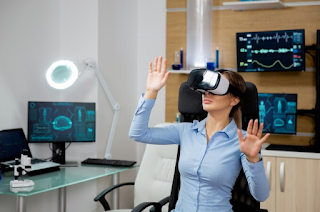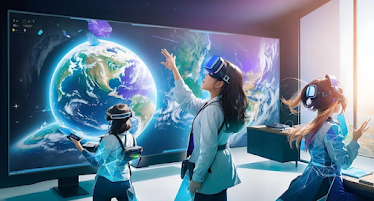How VR Game Development Services Bring Ideas to Life: From Concept to Reality
Gaming has always been a dynamic industry that is constantly evolving with the advancement of technology. Virtual Reality (VR) has taken the gaming world by storm, offering an immersive and interactive experience that was once the dream of gamers and developers. The ability to enter and interact with a virtual world has sparked the imaginations of both gaming enthusiasts and creative minds in the technology industry. However, turning these imaginative concepts into full VR games requires a complex and specific process. This is where VR development services come into play, turning ideas into stunning virtual reality. In this article, we delve into the exciting process of VR game development, where creative concepts are transformed into immersive digital worlds.
VR game development journey
VR game development services play a key role in bringing creative ideas to life in this immersive environment. Here's the journey from concept to reality in VR game development and how these services make it possible.
Conceptualization
Idea generation:
It all starts with a unique idea for a VR game. This idea can come from several sources, such as storytelling, game mechanics, or the desire to create a new experience in a virtual world.
Market Research:
VR Development Services conducts in-depth market research to identify potential gaps in the market, target audience preferences and trends. This study talks about the viability of the concept. Pre-production
Concept Refinement:
Once an idea is selected, it is refined. Game developers define game mechanics, story elements, and design concepts. At this stage, prototypes can also be made to test ideas.
Storyboards and Design:
Storyboards and design documents are created to visualize the environment, characters and interactions of the game. VR-specific aspects such as user interface and control systems are covered.
Technology selection:
VR game developers choose the appropriate hardware and software platforms for the project. This can include choosing VR headsets, development engines like Unity or Unreal Engine and input devices.
Team Building:
Assemble a multidisciplinary team of 3D artists, programmers, designers, writers, sound designers and QA testers. Each team member contributes their knowledge to the project.
Production
Prototyping:
Prototyping allows developers to create a small-scale version of a VR game to test game mechanics and user experience. This iterative process helps improve the game.
Art and Material Creation:
3D models, textures, animations and other assets are created to populate the virtual world. High-quality graphics are crucial for an immersive VR gaming experience.
Programming and Development:
Programmers write the code to bring the game to life, integrating functions of VR headsets, physics engines and artificial intelligence systems. Iterative testing and optimization occurs during this phase.
Sound and Music:
Sound designers compose music and create sound effects that increase immersion. Surround sound is especially important in VR because it increases the sense of presence.
Testing and quality assurance
Testing:
Rigorous testing is conducted to identify and fix bugs, errors, and gameplay issues. VR development services ensure that the VR gaming experience is smooth and comfortable for players.
User testing:
Real users, including gamers and new users of VR games, are invited to test the game. Their feedback is invaluable in refining the VR gaming experience. Startup and commissioning
Optimization:
Based on user feedback and post-release data, developers continue to optimize the game, fix issues and improve the game.
Marketing and Promotion:
VR game development services often help to reach the target audience and generate interest in the game through marketing and promotion strategies.
Updates and expansions:
VR games can evolve with regular updates and expansion packs, adding new content, features and improvements.
Community Engagement:
Building and engaging a community of VR gamers is critical to long-term success. Developers often have active communication channels where players can give feedback and share experiences. Taking a VR game from concept to reality is a complex and collaborative process that relies on the expertise of VR game development services. These services not only have technical skills, but also understand the unique challenges and opportunities of VR media. As VR technology continues to advance, the possibilities for immersive and innovative VR gaming experiences expand, making VR game development an exciting and dynamic industry.
Shamla Tech: a pioneer in VR game development
Recognized as a top VR game development company, Shamla Tech is at the forefront of the VR gaming world, offering exemplary VR development services. They understand the specifics of VR and bring visionary concepts to life with unprecedented precision. Careful market research, refinement of concepts and thoughtful selection of cutting-edge technology support their process and ensure the creation of compelling VR experiences. Their experienced, multidisciplinary team excels in prototyping, art creation, programming and rigorous quality assurance, ensuring top-notch VR games. As a top VR game development company, they continuously optimise, market and vastly enrich VR games and pioneer immersive game development.


Comments
Post a Comment